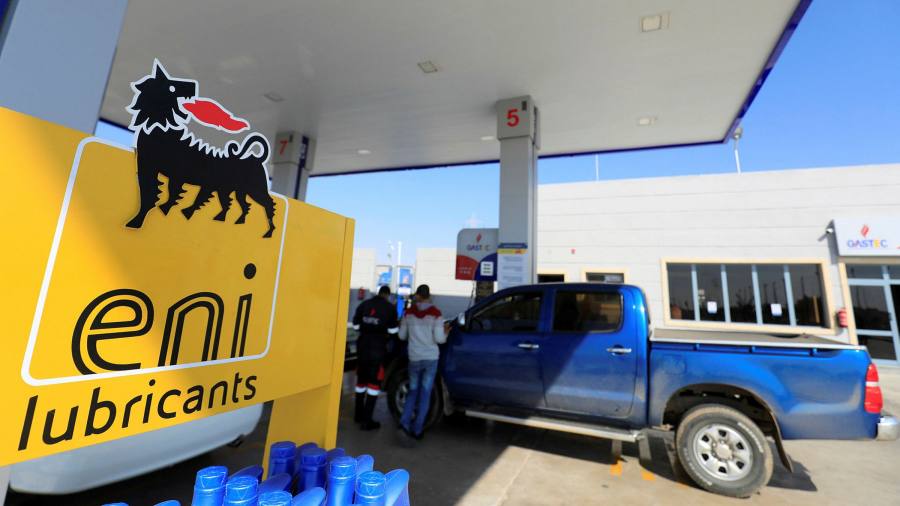[ad_1]
Italian oil company Eni swung to an annual loss in 2020, marking what its chief executive said was “a year like no other in the history of the energy industryâ€.
The Rome-based group on Friday reported an adjusted net loss of €742m last year, compared with a net profit of €2.9bn in 2019, but still ploughed ahead with accelerating its emissions reduction targets.
The pandemic caused demand for oil and gas to collapse and sent prices lower last year, hitting the finances of energy companies and forcing oil majors to report a string of losses in 2020.
Eni returned to profitability in the fourth quarter after a rebound in crude prices, amid optimism about vaccines, providing some relief at the end of a brutal year for the industry.
It reported a net profit of €66m in the final three months of the year, beating an analyst consensus forecast for a loss of €40m. But it was still down 88 per cent from the same period a year ago.
Eni’s performance was “underpinned by our operating cash generation and the effectiveness of our response to the crisisâ€, said chief executive Claudio Descalzi.
It was cushioned in the quarter by its oil exploration and production business, with higher prices offsetting an 11 per cent drop in output, as well as its power and renewables division.
The company confirmed a 2020 dividend of 36 cents a share.
Eni, like its rivals, is pushing ahead with its strategy for the energy transition to cleaner fuels, with growing pressure from investors and environmentalists to take action on climate change.
It laid out its corporate strategy for the next four years on Friday. This includes a plan to achieve carbon neutrality by 2050, accelerating emissions reductions to target net zero on an “absolute†basis that counts all emissions related to the business.
“We commit to the full decarbonisation of all our products and processes by 2050,†said Descalzi.
Twice weekly newsletter

Energy is the world’s indispensable business and Energy Source is its newsletter. Every Tuesday and Thursday, direct to your inbox, Energy Source brings you essential news, forward-thinking analysis and insider intelligence. Sign up here.
Spending in its traditional oil business is expected to fall by nearly a quarter between 2021 and 2024, with capital spending of €18bn over the period.
Eni aims to transform its portfolio over time through acquisitions and disposals of non-core hydrocarbon assets. It expects gross sales proceeds of €2bn by 2024.
It is shifting towards gas, chemicals, renewable power and other lower carbon strategies, with spending on these businesses — including its retail division — of about $8bn over the 2021-2024 period.
While many producers plan to invest more in cleaner energy, they are still reliant on fossil fuels to drive cash generation, meaning this is where they will direct most of their spending for years to come.
Oil production will grow at 4 per cent a year until 2024 to about 2m barrels a day, Eni said, after which it will plateau and the energy mix will shift towards gas and renewables.
To cut its emissions it also plans to invest in green refineries and carbon capture and storage projects.
Descalzi told the FT in an interview the company had been producing fossil fuels for decades, so “it’s not something you can change overnightâ€.
Some investors and activists have been pushing for oil companies to completely transform themselves by divesting from fossil fuels altogether.
But Descalzi said “it’s not about changing completely . . . we are oil and gas peopleâ€. While he said he wanted to broaden Eni’s energy mix and decarbonise it, hydrocarbons were “still really necessaryâ€.
[ad_2]
Source link





